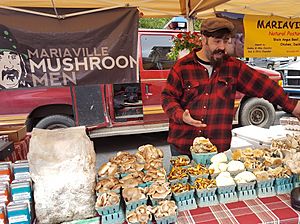Farmers' markets in New York City facts for kids
Did you know there are over 50 farmer's markets in New York City? These markets are run by an organization called GrowNYC under the name "Greenmarket." GrowNYC's Greenmarket program helps bring fresh, healthy food to people all over the city.
The main goal of Greenmarket farmers' markets is to support local farms. They let small family farms sell their fruits, vegetables, flowers, dairy, and other products directly to city residents. This means people in New York can easily find fresh, nutritious, and affordable food grown close to home.
GrowNYC also has a network called Greenmarket Co. This part of the program connects farms to many different customers. These can be fancy restaurants, popular food stores, or even local shops and community centers. The farms they work with are not just from New York State. They also come from New Jersey, Pennsylvania, and New England. This brings a huge variety of fresh foods to New Yorkers.
One very famous farmer's market in New York is the Union Square Greenmarket. It started in 1976 and is open all year round. You can visit it on Mondays, Wednesdays, Fridays, and Saturdays. The market has different sellers on different days. During busy times, up to 140 local farmers, fishers, and bakers come to sell their goods. Many New Yorkers who love food visit this market. You can find seasonal fruits and vegetables, special cheeses, meats, breads, pickles, jams, wines, and flowers. The market is in a lively part of the city. About 60,000 people come to shop, taste food, and meet the farmers.
How Greenmarkets Started
Creating the first farmer's market in New York City was not easy. Many groups had to agree to the idea. These included community leaders, city planners, local businesses, and even the office of the Mayor of New York City.
The very first farmer's market in New York City opened on July 17, 1976. It was located at 59th Street and Second Avenue. The idea came from Barry Benepe, an urban planner who grew up on a small farm.
In early 1976, Barry Benepe wrote a plan to get money for New York City's first Greenmarket. Barry was an architect for the city government. He noticed that many small farms around the city were disappearing. These farms could not compete with big commercial farms. So, they were selling their land to builders. This meant less fresh, local food was coming into New York City. Barry wanted to solve this problem.
The Council on the Environment of New York City (now GrowNYC) helped Barry make his idea happen. Barry became the project director for the Greenmarket.
Several organizations gave money to support Barry's idea. These included America the Beautiful Fund, the J.M. Kaplan Fund, the Fund for the City of New York, and the Vincent Astor Foundation. On July 17, seven farmers from Long Island, New Jersey, and upstate New York came to sell their products. The first Greenmarket quickly became very popular.
The New York City Department of City Planning soon suggested opening more markets. A second market opened at Union Square on August 30, 1976. A third market opened in Brooklyn on September 1. Some market locations were free to use, but others, like the one in Brooklyn, cost money to rent. To cover these costs, farmers paid a small fee based on their truck size and where their market was located.
Farmers also had to follow some rules. They needed to be approved by a local farming expert. They had to offer fair prices and use scales. They also needed a sign showing their farm's name and location. And, they had to clean their selling space at the end of the day. Farmers often made between $300 and $1,200 on each market day. At first, the markets were only open on Wednesdays. The New York City Greenmarkets used to close from October to April, but now many are open year-round!
 | Leon Lynch |
 | Milton P. Webster |
 | Ferdinand Smith |


